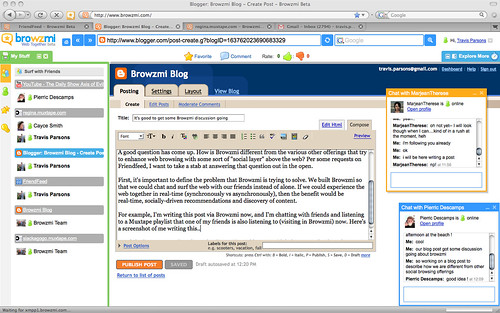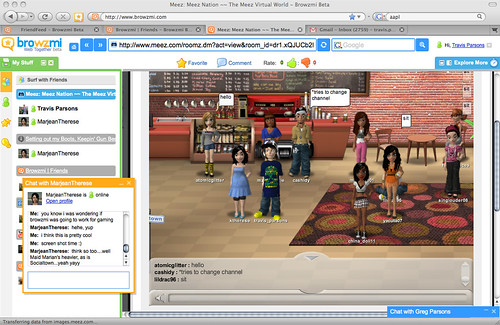As hoped, Louis' post prompted some good surfing and chat activity at Browzmi. But more importantly, it started a conversation with some threads on Friendfeed.
A good question has come up. How is Browzmi different from the various other offerings that try to enhance web browsing with some sort of "social layer" above the web? Per some requests on Friendfeed, I want to take a stab at addressing that question out in the open.
First, it's important to define the problem that Browzmi is trying to solve. We built Browzmi so that we could chat and surf the web with our friends instead of alone. With the ability to see each other's surfing location, we can now share, discover and experience content together in real-time (synchronous sharing experience vs asynchronous).
I no longer poke around the web by myself as I'm now pretty much "surfing" with other Browzmi users whenever I am online. By surfing I do not mean co-browsing - I am not being dragged along by another user. I'm hanging out online and choosing to chat and follow friends around the web. It's an experience very much like instant messaging. And like instant messaging, my participation in Browzmi is completely opt-in; I stay online in Browzmi just like I would in IM.
For example, I'm writing this post via Browzmi now, and I'm chatting with friends and listening to a Muxtape playlist that one of my friends is also listening to (in Browzmi) now. Here's a screenshot of me writing this..

Here's another example from the other day, when Marjean was kind enough to show me around Meez in Browzmi, which was cool because we could actually follow each other from room to room there. (that's Marjean and I inside the Meez room and also chatting in Browzmi).

So in what category does Browzmi reside? I want people to think of Browzmi like instant messaging - but with an additional level of "presence" added into the mix. Browzmi's buddy list not only shows that you are online to chat, but it also displays where you are surfing. In Browzmi, our surfing presence - relative to each other and our friends - provides a context for communication, and a means to experience stuff online together. So for categorization of our offering, I would like to place Browzmi in the same space as other synchronous, web-based communications apps such as Meebo.
People are right to say that the "social browsing" space has it's share of attempts to add a social layer above the web. We did not create Browzmi to be an annotation tool, as these products do not focus on presence and real-time interactions between friends (sticky notes as an example).
However, there are (and have been) many products in the social browsing space with a focus on surfing with friends and showing other people surfing online. While there have been unsuccesful attempts in this space, there are also cool companies with good ideas and active, growing communities. Just this week, Rocketon received some more press on their MMOG layer above the web, which looks like fun (and they are backed by DE Shaw, which is no slouch investor). This problem is compelling; everyone surfs the web alone today, so you are going to have attempts to solve it. At the end of the day, someone will deliver the implementation with the right characteristics to take off and build a business.
So how is Browzmi different from other offerings where you surf with friends and others online? I think our feature set and its use cases, which I have described a bit above are compelling (where you can IM and see where friends are located and choose to follow or not), but we also have some more fundamental differences:
- Browzmi is a web service. You do not need to download any software or browser add-on to use Browzmi. Our goal from the start has been to build Browzmi as an online app so that people could get started easily and access Browzmi from various devices (and so that we could be a part of the cloud - see below). I believe all other offerings are based on a client-side implementation. While we offer our Browzmi Homebase extension (currently available for Firefox 2 and 3), it is something a user may choose to install after discovering that they like Browzmi. I believe any type of download throttles adoption and limits the diversity of the possible user base. Our web-based position introduces challenges (such as website compatibility) that we will continue to overcome, but the benefits are obvious.
- Browzmi works with 2 people or many people. The core features of Browzmi - instant messaging and surfing together - do not require a critical mass of users to be successful. Browzmi is fun to use with just a single friend online with you (and when we finish our integration to the large chat networks, this value will be enhanced). Many social browsing products have focused on features that require some level of critical mass to deliver value to the user. As we've built Browzmi, we've had a very small community of active users - but we've been having fun anyway. Certainly, things become more fun when you can meet new people, but our value is not dependent upon mass.
- Browzmi's features are not bound by the chrome of a web browser. As a designer of features, I like that Browzmi is not part of the chrome of a web browser. Browzmi is not a browser sidebar or toolbar, and as a result, we have increased freedom to make Browzmi a part of the web service community. Everyone notices that Browzmi looks like a virtual web browser (and if you put it inside a dedicated browser app like Prism or Safari 4, Browzmi is a virtual web browser). Our independence from the browser chrome will hopefully allow us to provide a more compelling service over time, whereby we enable users to customize Browzmi with personalized widgets, themes and update actions. In addition, we complement our application UI with a website where we can provide profiles, aggregations and search results. If you are inside the chrome, then the browser is the platform. Since we're outside the chrome, the web is our platform.
- Our goal is to open Browzmi to integration and customization. Question: what is the last part of your online experience that is based on your desktop? - Well it's your web browser. What if your browser was somehow in the cloud and woven into the fabric of web services in which you participate? Browzmi can not operate without what I'll call a "host" (a client web browser), but we can provide a user interface for surfing that resides in the cloud and is connected to your friends, your services and your interests. This longer-term opportunity is in the back of our minds as we work on Browzmi 1.0 here. Accordingly, we want to engage in conversations on how to integrate Browzmi with other web services to push this vision along.
Cheers!
